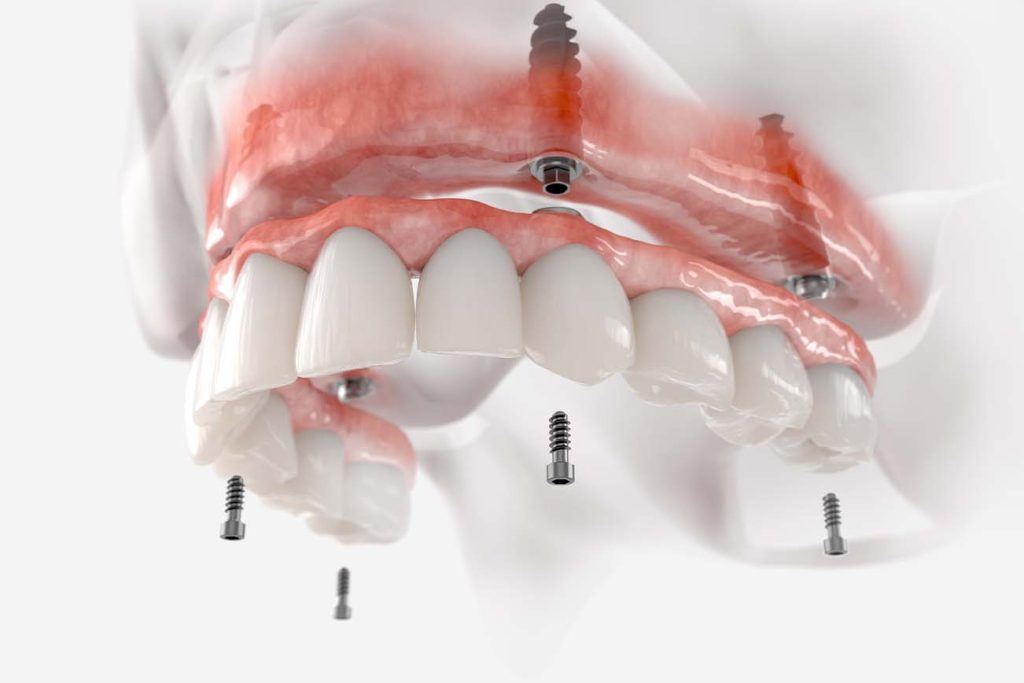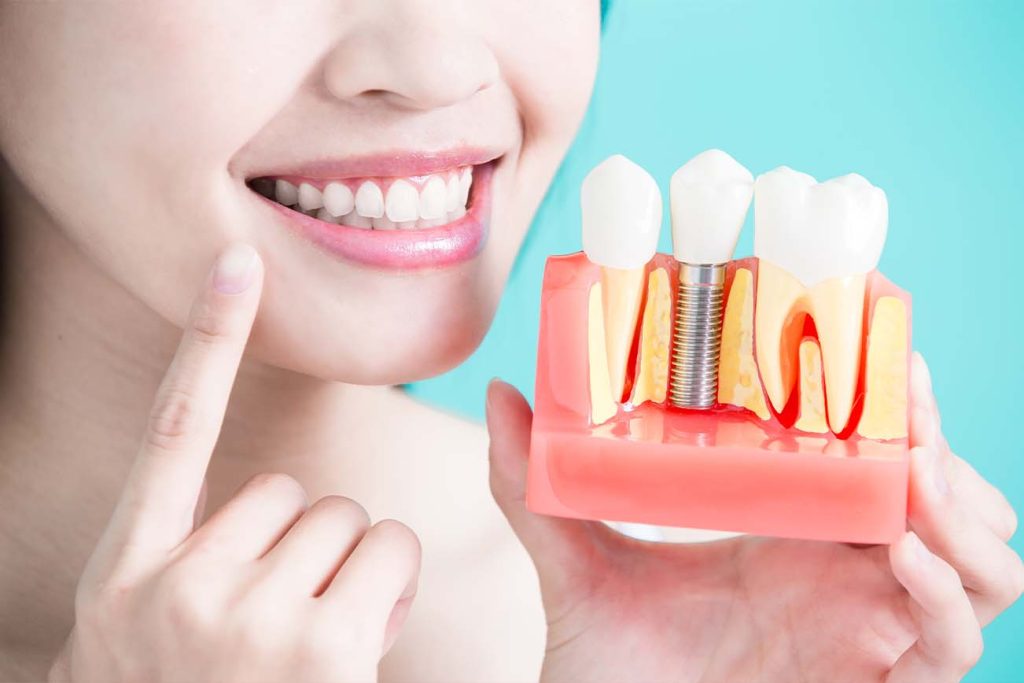How do Dental Implants work?
Missing teeth have devastating effects on your appearance. In addition, they cause surrounding teeth to shift out of place and affect your diet. Although there are several teeth replacement options, dental implants are the most durable.
Implants replace your tooth root, and they have a structure that fuses with your jawbone to replace your missing teeth. Kindly read further to know more about the dental implant structure and who qualifies for them.
What are Dental Implants?
Dental implants are tiny screws that your dentist at Dentakay dental clinic places in your jawbone to replace the tooth root. These screws fuse with the jawbone and act as a base for the artificial teeth. Because the implants are made from titanium, they are biocompatible. As a result, they do not cause adverse reactions to the jawbone or gum tissue.

The Dental Implant structure
The dental implant has a structure consisting of the post, abutment, and artificial teeth. The post or fixture is the base, while the abutment connects the post to the prosthetic teeth. Understanding dental burs and their uses can further elucidate the intricacies of prosthetic teeth fabrication, as these precision tools play a vital role in shaping and refining dental restorations to ensure optimal fit and functionality.
Post/Fixture
The implant’s post is the base and functions as the tooth root. This post is sturdy and fuses with the jawbone without causing adverse reactions. When placing a dental implant, the fixture comes first. Your dentist will place it in the jawbone as an artificial tooth root. Afterwards, the jawbone fuses with the post through osseointegration.
Abutment
The abutment is the connector between the post and the prosthetic teeth. One end of the abutment fits in the post, and the other fits on the artificial teeth. Abutments can either be prefabricated or custom-made. The type of abutment your dentist uses will suit your prosthetic teeth.
Prosthetic Teeth
The prosthetic teeth are the final stage of the implant placement process. During this stage, your dentist will mount the artificial teeth on the abutment. The prosthetic teeth can be a dental crown, bridge, or denture.
Dental crowns are suitable for people missing one or more teeth that are not adjacent to each other. Bridges are for missing teeth and are adjacent to each other. Dentures, however, are suitable for people without an entire arch or mouthful of teeth.
Who qualifies for Dental Implants?
Before getting any dental procedure, you must consult a dentist to ensure you qualify. Factors that determine if you are eligible for dental implants include;
Jawbone and gum health
The success of a dental implant swindon procedure depends on the health of your jawbone and gums. Your dentist places the implant in your jawbone, where it fuses to stay in place. However, if the jawbone is not dense or healthy enough, it may not secure the implant. In cases like this, your dentist may recommend a bone graft.
Furthermore, the gums support the implant root and allow the prosthetic teeth to rest on them. Periodontal disease results in gum degradation, which can impact the success of a dental implant. Patients with periodontal disease often experience further gum degradation if there are no significant changes to oral hygiene.
Medications
Before a dental procedure, you must discuss the medications you are taking with your dentist. Some drugs contra indicate anaesthesia during the implant surgery. For instance, NSAIDs like aspirin can cause excessive bleeding.
Age
The jaws keep developing, and these changes can affect the success of an implant. Because a dental implant requires a firm foundation, your dentist will examine the level of jaw development. Furthermore, because of these changes, dentists do not install implants in patients younger than 18, except if necessary.
Fortunately, there is no upper limit for dental implants. Anyone above the age of 18 can get zygomatic implants as long as they do not have any significant risk factors.
Risk Factors
Health conditions like Parkinson’s disease, diabetes, and other autoimmune disease increase the risk of infections and complications after implant surgery. In addition, patients with psychological problems or using medications for bone deterioration diseases, including osteoporosis, may not qualify for dental implants.
Lifestyle also affects the success of dental implants. For example, people who smoke or consume alcohol may not qualify for implants because tobacco and alcohol inhibit healing.

What is the length of a dental implant procedure?
According to Dentakay Dentist, Dr. Gülay A dental implant procedure typically takes about six months. This is because each stage of the procedure requires healing. For instance, after your dentist places the implant post, the jawbone has to fuse and heal around the implants before you can get the abutment and prosthetic teeth.
What is the cost of Dental Implants?
The cost of dental implants varies depending on the location. Implants are cheaper in some places due to medical tourism. For instance, the price of implants in Turkey is significantly more affordable than in the USA and the UK. You should get a single unit of dental implants for $4000 and $2500 in the USA and UK, respectively. In Turkey, on the other hand, this cost is between $650 per unit.
How painful is a Dental Implant procedure?
A dental implant procedure is not painful because your dentist will administer anaesthesia to numb the surgical site. However, the effects of the anaesthesia should wear off after the surgery. Although you may feel a slight discomfort afterwards, it wears off after a few days.
It is best to follow the aftercare tips your dentist prescribes. You can use pain relievers and antibiotics to relieve pain and prevent infection. In addition, avoid hot foods and beverages and avoid brushing vigorously.
Improve your oral health today!
Dental implants work by fusing with your jawbone and having a prosthetic tooth connected by an abutment. Implants are long-lasting and can withstand biting and chewing forces. In addition, dental implants are ideal for you if you miss one or more teeth. Your dentist will examine your mouth and health history to see if you qualify for the procedure. Fortunately, the procedure is safe and pain-free.
![[AD] ✨ Festive magic for local families in the heart of Guildford ✨
We had the loveliest evening exploring the @guildfordilluminate light trail at Guildford Castle
The trail takes around 30–40 mins
with cosy stops for hot chocolate and toasting marshmallows, it’s a gorgeous Christmas activity for Surrey families.
It’s on until 4th January and makes the perfect festive plan:
🛍️ Christmas shopping in town
✨ The light trail
🍽️ Finish with dinner in Guildford
If you’re looking for a magical, stress-free festive outing with the kids — this is one to add to your Christmas list
📍 Guildford Castle, Castle St, Guildford GU1 3SX
#GuildfordWithKids #SurreyFamilies #ChristmasInSurrey](https://suburban-mum.com/wp-content/uploads/2018/09/589257185_18566118850016840_4432952740767953046_n-180x320.jpg)
![[AD] We went to the newly opened Cha Sha Kingston a couple of weeks ago, and wow — taste bud adventure unlocked! The boys devoured the masala fries and chicken tikka rolls, while we couldn’t get enough of that epic kebab butter curry 😍🍛.
It’s amazing value for food this tasty (and everyone left happy and VERY full!).
Delicious food, vibrant vibes and incredible value — the perfect combo for your next meal.
📍Cha Sha Kingston
43 Surbiton Road, KT1 2HG
🌐 chasha.co.uk
Other Cha Sha locations in Birmingham, Ilford, Southampton and Wembkey
#ChaSha #ChaShaKingston #KingstonEats #FoodieFinds #UKFoodie #FoodReview #KingstonUponThames #FamilyEats #FamilyDining #FoodieKids](https://suburban-mum.com/wp-content/uploads/2016/02/574770541_18560351146016840_6855048070839528040_n-180x320.jpg)

![[AD] We’re a cricket-mad family, so we’re buzzing that @thehundred is back this August! 🏏🔥
To get ready, M tried out the official FREE Activity Pack — and it’s brilliant! 🙌
Packed with fun games, creative challenges and sporty tasks, it’s perfect for getting kids hyped whether you’re at home or on the go.
👉Download yours now (link in bio)
@londonspirit @ovalinvincibles #EveryMomentCounts #TheHundred
#EnglandCricket #CricketFamily #TheHundredCricket #LondonBloggers #Cricket #CricketIsLife #kidsfun](https://suburban-mum.com/wp-content/uploads/2022/11/505472555_18531279601016840_7092520074819907569_n-180x320.jpg)



![[AD - Press visit]
We enjoyed the glorious sunshine this weekend with a trip to Brighton. We went on the @brightoni360official which is right by the sea front.
The i360 pod take a slow journey up, allowing you to take in views across Brighton and the South Downs 450ft above ground. There’s a bar inside with drinks and snacks available to purchase and the experience lasts 25 minutes.
Afterwards, we headed to the open air roller rink for a roller skating session!
The roller rink is:
⭐ Suitable for over 5s
⭐ £6.50 if you have your own skates or £9.50 if you need to hire them
⭐ 45 minutes per session
Full details to visit the i360 + skating
📍 Brighton i360, Lower Kings Road, Brighton BN1 2LN
🚗 Parking nearby (we parked in the Regency Square Car park)
🎟️ Prices start from £25.40 for an adult and £16.90 for a child
🕐 Opening hours are currently Sun-Fri 10.30am-18.30pm and until 19.30pm on Saturdays
☕️ Bar inside the i360, cafe and gift shop
Book tickets here:
https://tickets.brightoni360.co.uk/tickets/?_ga=2.195305772.1869001490.1689671753-1757164059.1689671753/#events?eventid=157](https://suburban-mum.com/wp-content/uploads/2015/04/417980235_313576471048632_3682382982231216432_n.jpg)

![[AD] ***Summer of fun at Barracudas Activity Camps!****
There is plenty for kids to do at @barracudas_activity_day_camps
From Tennis, Archery, Swimming, Motor Sports and more you can be sure that there will be something for kids aged 4.5-14. ⚽🏈🥅🎾🏓🏎️🏹🏊♂️🏉
You can book on a day by day basis - so it can fit in with any other days out/activities you have planned and there are early drop off and late pickup options available. Barracudas are also Ofsted registered so you can use your Childcare Vouchers too.
⭐⭐⭐Get £20 off a week or £4 off a day using my discount code: MARIA20⭐⭐⭐
#BarracudasActivityDayCamp #BarracudasActivityCamp #BarracudaAmbassadors #SummerHolidays #SchoolHolidays #Summer2023 #SummerCamp #DayCare #Camp #KidsCamp #surreymummy #surreymums #SummerOfFun #ActivityCamps #HolidayCamps #Childcare #SchoolHolidays #schoolholidaycamps](https://suburban-mum.com/wp-content/uploads/2024/07/353583570_625625966167953_545896259645102575_n.jpg)



![[AD] We have some super exciting news...we have been chosen to be Laser Quest Ambassadors, and the boys are over the moon!
We are really lucky that our local Laser Quest (@laserquestkingston) is just around the corner from us. It means we can pop in of a weekend or anytime during the school holidays, and with summer just around the corner, I know Laser Quest will be one of our go-to places for some family fun.
As well as games of Laser Quest, there are also VR experiences and arcade amusements too. To find out a bit more about how Laser Quest works, you can read my blog post: https://www.suburban-mum.com/laser-quest-kingston/ (clickable link in bio)
Don't forget to keep an eye out for our Laser Quest posts - I'm going to be giving away two family passes to use at Laserquest Kingston!
If you can't wait and want to head down to Laser Quest to try it out, use the code SUMMER30 for 30% off your booking. The code is valid from now until the end of August 2023 and can be used on Laser Quest games and birthday party bookings.
#LaserquestAmbassador #Laserquest #LaserquestKingston #ActivitiesForKids #FamilyFun #DaysOutWithKids #Lasertag #LaserquestVR #Kingston #ThingsToDoInKingston #SurreyFamilyDaysOut #ThingsToDoWithKids #RainyDayFun #SurreyMummy #SurreyLife #LifeWithKids #LifeWithBoys #familyfunday](https://suburban-mum.com/wp-content/uploads/2015/04/353230107_797358078406942_2405522556733455165_n.jpg)

![[AD] The sun has finally made an appearance and the boys have been making the most of it by spending it
in the garden.
They’re go-to is always football and they’ve been trying to improve their aim and accuracy with the new Messi Foldable Footlball goal from the #MessiTrainingSystem range.
I love the fact the goal is foldable, making it easy to store away when not in use. It is also lightweight so you can effortlessly pack it up and take it to the park or to a friend’s house.
The Messi Foldable Football Goal retails at £36 and can be purchased from @argos
You can read my full review here: https://www.suburban-mum.com/messi-foldable-football-goal/
#TrainLikeMessi #FoldableFootballGoal #FootballSkills #OutdoorFun #LionelMessi #LeoMessi #FootballAtHome #OutdoorKids #JustGetOutside #OutdoorsAndFree #ScreenFreeKids #WhateverTheWeatherKids @flair_gp](https://suburban-mum.com/wp-content/uploads/2015/04/341194882_615024710178056_41977149395989448_n.jpg)

![[AD] We are absolutely thrilled to announce that we are Barracuda Ambassadors again this year.
With Easter just around the corner, the boys were sent the @barracudas_activity_day_camps new camp kit in preparation for the school holidays.
There’s a wide range of activities for kids aged 4.5 - 14 including Tennis, Archery, Basketball, Arts & Crafts and more.
If you like the sound of Barracudas, find out more over on their website. You can also save £20 a week or £4 a day, using my discount code: MARIA20](https://suburban-mum.com/wp-content/uploads/2024/07/336812306_765234558514317_685553691647241974_n.jpg)





